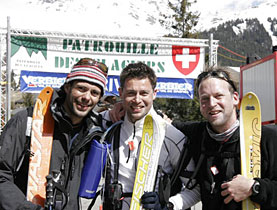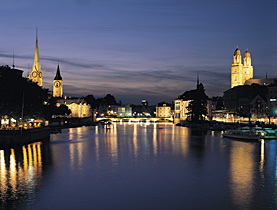Why Swiss businessmen are on the run

The Swiss are frontrunners in many international surveys on wealth, quality of life and business appeal. But they are also leaders when it comes to marathon races.
While they are not necessarily first across the finish line, the Swiss – per capita – outnumber most other Europeans taking part in the biggest international events.
In last year’s New York City Marathon, the largest and best known race of its kind, 750 Swiss completed the 42.195km course. There were three times as many Germans, but Germany has ten times Switzerland’s population.
And Swiss participation per capita is at or near the top of the other major marathons (London, Berlin, Boston, Chicago), with only the Dutch, Danish and Norwegians coming close.
Various surveys of marathon runners have found that elite businessmen – not necessarily elite athletes – figure prominently among the runners. Switzerland has more than its share of top managers since it is a leading financial and insurance centre, and where many multinationals have their headquarters.
They are seeking personal achievement and self-esteem, according to professor Thomas Bieger of St Gallen University, who has analysed the marathon boom in Switzerland. “We have a high concentration of well-educated people and a high income group, and there is an emphasis here on doing sport and keeping healthy,” he told swissinfo.ch
Amateur runner and travel agent Markus Roth has taken advantage of the demand.
His agency, Albis Reisen, specialises in “marathon holidays”, organising race entry, air fare, accommodation, transfers to the starting line and other frills for up to 700 Swiss people a year, including 250 for the New York City event alone.
Novices
“Around 30 per cent of our runners are participating in the New York City Marathon for the first time,” Roth says.
Roth describes most of his marathon customers as “upper middle class” with plenty of managers among them.
One of Roth’s clients who fits the profile is Philippe Tschannen, a headhunter who recruits executives for posts in the financial sector. swissinfo.ch caught up with him during a training run along the Lake Zurich shore.
“If I have to do one, then I’ll do the nicest and most famous one,” Tschannen says while pounding the pavement on a cold, wet spring morning.
The New York City Marathon will be the second of two sport “challenges” the 38-year-old has set for himself this year.
The first was competing as a beginner on the icy Cresta Run skeleton track in St Moritz back in February.
Goal: to finish
Tschannen has never taken part in a marathon, and has yet to run the distance in training. His goal is simply to finish the race. It will likely be his first and last marathon, he says, even though he has discovered side benefits: “I think about work-related issues when running, and return to the office with some good ideas.”
But it is not only the major events like New York’s which are popular. Nine marathons are being held in Switzerland in 2010, as well as numerous long distance races of varying lengths; mountain marathons, triathlons and even a Gigathlon where athletes swim, run, inline skate and cycle more than 400km, overcoming 8,000m in altitude, in two days.
Zurich’s New Year’s Marathon begins at the stroke of midnight on January 1, to claim the title as the year’s first. It saw participation double in 2010 to 650 runners.
The very scenic – and arguably one of the toughest – is the Jungfrau Marathon, starting in the resort of Interlaken and ending 1,800m higher at the foot of the mountain the race is named after.
It is so popular that the 4,000 starting places are booked out eight months in advance.
President of the Jungfrau organising committee, Christoph Seiler, told swissinfo.ch that the average age of the runner is rising and is now between 40 and 45, and average finishing times are becoming slower. But there is not necessarily a correlation between the two.
Once in a lifetime
“When I started running 20 years ago, participants were focussed on races. Today, it’s trendy to do a marathon once in a lifetime,” Seiler said, adding that about 40 per cent of those who were lucky enough to be granted a starting number are first-timers.
Completing the race is a symbol of success, and, according to Seiler, something they can put on their CVs. In return, they leave behind more than SFr3 million ($2.7 million) in three days – spent mostly on accommodation, shopping and meals – making the Jungfrau Marathon a lucrative business.
New York is a good example of how important long distance races can be for a town or city’s economy. Hotel prices skyrocket and restaurants do a booming trade when the high-flying manager-runners are in town.
If he gets tired during his first marathon, Tschannen says he may make a pit stop at one of New York’s upper class dining establishments.
“I can stop at Cipriani’s, eat a plate of pasta and then continue the run.”
Dale Bechtel in Zurich, swissinfo.ch
Professor Thomas Bieger of St Gallen University studied the motivations of runners who took part in the 2008 Jungfrau Marathon. Bieger found that most were competing for fun, and wanted to challenge themselves doing something unusual which would also help them keep fit.
Overall, personal and social goals as well as health concerns were the main motivational factors. An interesting route and varied scenery are the most important criteria participants use when choosing a marathon. Runners also demand a perfectly organised event.
The name “marathon” comes from the legend of Pheidippides, a Greek messenger. It states that he was sent from the battlefield of Marathon to Athens to announce that the Persians had been defeated in the Battle of Marathon.
It is said that he ran the entire distance without stopping and burst into the assembly, exclaiming “We have won”, before collapsing and dying. However, there is debate about the historical accuracy of the legend.
The marathon was one of the sporting events in the first modern Olympic Games, held in Athens in 1896. The winner was Greece’s Spiridon Louis who covered the 40km in a time of 2:58:50.
The distance of 42.195km did not become the official length until 1924. The Olympic record holder is Kenya’s Samuel Kamau Wanjiru, who completed the marathon at the 2008 summer games in a time of 2:06:32. (source: Wikipedia)

In compliance with the JTI standards
More: SWI swissinfo.ch certified by the Journalism Trust Initiative













You can find an overview of ongoing debates with our journalists here . Please join us!
If you want to start a conversation about a topic raised in this article or want to report factual errors, email us at english@swissinfo.ch.